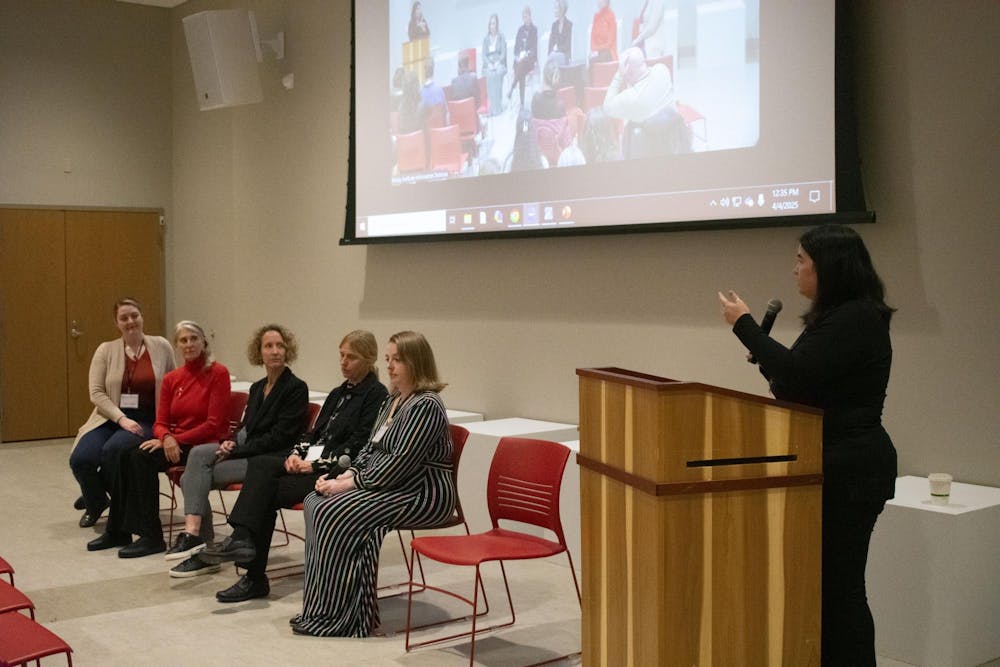Editor’s Note: This story includes mention of sexual violence and assault. Resources are available here.
The Kinsey Institute held its “Understanding and Preventing Sexual Violence” 2025 research symposium at the McCalla School on Friday.
The event drew field experts, including keynote speaker Mary Koss, who published the nation’s first sexual exploitation survey of college students.
The goal of the symposium was to better understand sexual violence through research. It primarily focused on a revision to the Sexual Experiences Survey - Victimization survey, which is intended to measure sexual exploitation among adults. The revision is the survey’s first since 2007.
Koss said the goal of the survey was to eventually help decrease instances of sexual exploitation through having a better understanding of it.
“We’re ultimately trying to reduce these behaviors,” Koss said. “How are we going to measure if we are accomplishing that reduction?”
According to the survey’s abstract, the major revisions include a different definition for consent, new tactics and acts of sexual assault to consider in the survey, wording and increased gender and sexual orientation inclusivity.
The new survey and preliminary findings were published July 2024 in the Journal of Sex Research. One preliminary finding reported 67% of respondents experienced exploitation facilitated by technology. Being sexually targeted online was one of the main additions since the 2007 revision.
Koss said that the survey had already been translated into other languages, such as Spanish and French, to collect data outside of the United States.
“We're trying, step by step, to broaden the use of the SES-V in as many identifiable communities as we can,” Koss said.
She spoke about concerns of advancements in AI-generated pornography. The quickly advancing technology made it difficult to try and create an evergreen survey.
“I want everyone’s experience of sexual exploitation to be counted, to be seen,” RaeAnn Anderson, panelist and assistant professor at the University of Missouri-Kansas City, said. “That is, kind of, my hope for how it’s used.”
Since August 2024, the Indiana University Police Department has received reports of 32 rapes and 18 sexual batteries.
The IU Office of Institutional Equity published a report detailing sexual misconduct numbers from the 2022 to 2023 Academic year in February 2024.
Among students at the IU Bloomington campus, there were:
- 38 reports of dating or domestic violence
- 141 reports of sexual assault and contact
- 36 reports of sexual exploitation
- 63 reports of sexual harassment
- 32 reports of stalking
Zoe Peterson, the director of the Sexual Assault Initiative at the Kinsey institute, spoke on the complexities of consent, especially in terms of education.
“We have to teach that consent is complicated,” Peterson said. “You need to have lots of conversations about it, and if you're in a relationship with your partner, and really talk about consent.”
IU students have already begun to use the SES-V to inform their research. Brianna Akers, a third-year counseling psychology doctoral student at IU, reported her research using the updated version of the SES-V to investigate how people with autism spectrum disorder experienced sexual exploitation.
She found that a diagnosis of ASD is predictive of higher instances of sexual victimization.
“There's some unique factors that might contribute to an increase in vulnerability for this population,” Akers said. “One of which is this assumption that individuals with disabilities are childlike and therefore couldn't possibly be interested in sex, and so this leads to a natural decision to not provide any sex education at all.”
Lucy Bhuyan, a doctoral candidate at IU interested in doing research on LGBTQ+ victimization, said she plans to use the new SES-V survey in her research on bisexual women’s experiences with victimization on college campuses.
She said while learning more about sexual violence and victimization at the symposium, she has more questions due to the complicated nature of experiences with sexual assault.
“These experiences we have, you know, are very damaging and also are very common,” Bhuyan said. “I’m excited that we’re continuing to sort of ask that question and trying to know more and do better in this field.”
Taren McGray, a doctoral candidate at the University of Arizona, presented her research on “Sexual Exploitation Across Queer, Trans, and Cisgender Heterosexual Populations.” She found sexual orientation and gender identity both had a strong influence on sexual exploitation risk. According to her research, the risk was higher for bisexual and heterosexual cisgender women than lesbian cisgender women while gay cisgender men had an elevated risk compared to bisexual and heterosexual cisgender men.
McGray said the revised SES-V has become a critical tool for studying the queer and trans population.
Carlin Hoffacker, a doctoral candidate studying counseling psychology at IU, said she is specifically interested in research on sexual aggression perpetration. She said she is interested in doing more research on perpetrators’ understanding of their encounters with others.
“What are the ways that we can build those into our measures so that we can be accounting for them in our prevention programming?” Hoffacker said.
The Kinsey Institute has experienced scrutiny from the state government, which passed House Enrolled Act 1001 in 2023. The act mandated that “State appropriations may not be used to pay for the administration, operation, or programs of the Kinsey Institute.”
Since the act was passed, letters sent between Indiana Comptroller Elise Nieshalla, Indiana Attorney General Todd Rokita and IU detail inquiries from the state government into Kinsey’s funding and IU’s compliance with the law regarding the institute remaining on campus property.
IU has maintained it is in compliance with the law and that it does not require it to relocate the institute, which currently occupies the third and fourth floors of Lindley Hall and has continued to support it financially through grants, donations, auxiliary income and out of state tuition.
A list of resources is available here if you or someone you know has experienced sexual harassment or abuse.
CORRECTION: This story has been updated to correctly reflect Taren McGray's research.




